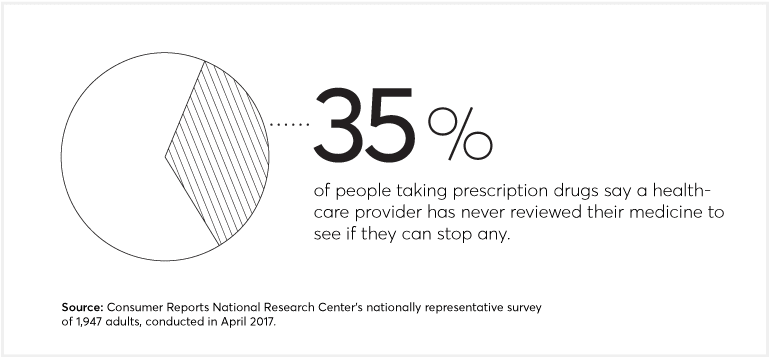Maybe We Don’t Need To Take So Many Prescription Drugs Image courtesy of Edward Kammerer
Do you take any prescription drugs? If so, you’re in the majority in this country. Drugs are life-saving or life-lengthening interventions most of the time, but can also interact with each other and cause further health problems.
Our colleagues down the hall at Consumer Reports took a nationally representative phone survey of adults, and found that most people are on multiple medications, yet haven’t had all of them reviewed by a health care professional, and that different prescribers that we see may pile on more drugs instead of trying lifestyle interventions that may work as well or better without side effects.
Saving lives and money, maybe
Last year, CR reports, 1.3 million Americans visited the hospital because of adverse effects from medications, and 124,000 died as a result of medications that caused severe side effects or interactions. Yet patients rarely think about this. And despite the fact that there are computer systems designed to catch serious interactions, these don’t always work.
Taking too many prescriptions can also be very costly for patients and for insurers. One market research company, MS Institute for Healthcare Informatics, estimates that medications that people don’t need and medical care for the complications that result cost $200 billion every year.
“Pre-disease intervention” can lead to excess medication
Providers may prescribe drugs to treat chronic conditions before patients have officially developed them, like diabetes and hypertension. Yet these patients have prediabetes or prehypertension, which means that the disease hasn’t yet developed, and patients may be able to reverse them through diet and exercise.
While you should make sure to discuss your own issues with health care professionals, CR flagged a few conditions that can often be helped with weight loss, changes in diet, or other lifestyle changes before trying prescription drugs.
Conditions like insomnia and heartburn may also have other answers before adding prescription drugs to your regimen.
Brown bag it
One exercise that may be helpful, especially for people who are taking ten or more different medications, is what’s called a “brown bag review.”
That’s when you throw all of the drugs and supplements — prescription and non-prescription — that you take into a bag and review them with a doctor or pharmacist to see if perhaps you can stop taking any of them. Your doctor will help you safely stop taking any medications you don’t need or that interfere with others, gradually decreasing the dose if needed.
Consider these tips to manage your drug regimen:
• Have a review with a doctor or pharmacist once a year of everything you’re taking.
• Don’t cut the dose or stop taking a drug without checking with your doctor first.
• Make sure that all of your health care professionals have a list of the medications you’re taking, and that the person who is your emergency contact also has a list in case of a health care emergency.
Want more consumer news? Visit our parent organization, Consumer Reports, for the latest on scams, recalls, and other consumer issues.


